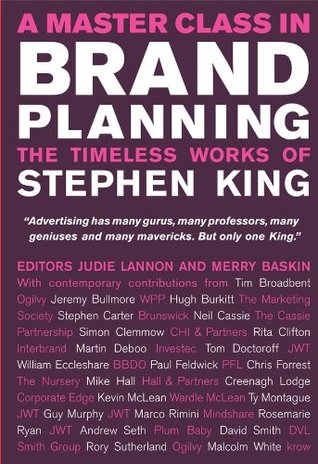More on this book
Kindle Notes & Highlights
Stephen’s writings share many qualities but the rarest is this: when you’ve read them, and absorbed them, you know exactly what you have to do.
These three articles remind us that great planning isn’t creativity; it is grounded creativity.
“We need to be intuitive, instinctive, scared and lucky AND we need to be rigorous, disciplined, logical and deductive” (Bullmore, 1991).
“Bright ideas must survive sharpshooters in the marketing department and snipers on the Plan Board, before they stand a chance of being seen by the client.”
Partly because of this the advertising tended to be based on the idea of reliability and guaranteed quality.
People choose their brands as they choose their friends. You choose friends not usually because of specific skills or physical attributes (though of course these come into it) but simply because you like them as people. It is the total person you choose, not a compendium of virtues and vices.
“use research as a drunk uses a lamppost – for support rather than illumination”.
from backside-covering instincts, but also from that overpowering human urge to create a sequential narrative around any series of events – especially when presenting a business case study.
Today’s planner is perhaps attempting to fly a brand with far fewer instruments and just using the pedals.
Advertising is at risk of becoming a place for arts graduates with rich parents.
He thought of Science as a spiritual adventure. He said the main needs in Science and in scientists are vision and creativity.
I think one of the critical things that Popper has said about this is: you don’t start with observations. You start with what he calls a trial solution, what we might call an idea. He wrote, in fact: “Observations are always interpretation of the facts observed. They are interpretations in the light of theories.”
Einstein put it, “Theory cannot be fabricated out of the results of observation – it can only be invented.”
The Old Science is saying: build it up gradually, step-by-step, brick-by-brick; and the New Science is saying that what you have to do is invent a solution right from the beginning, even if it is wrong. It seems to me that the process of invention according to the New Science is somewhat like Figure 3.3
First of all what you have to do is pat the idea into shape, make it into a coherent theory – form a hypothesis, with sentences that start off “I wonder if. . . ”. “I wonder if we did so and so what would happen?”
Secondly – and something we do all too little – is going back to modify the problem. Very often it is impossible to understand the problem we ought to be solving until we’ve tried out a solution.
If we are not careful, Gap Analysis is a very elaborate machinery for saying that if there is already a market for hot coffee and a market for iced coffee, the gap for us is in selling warm coffee.
And that is because it was designed to appeal to a feeling for the associations of exclusivity in a wide range of people.
As marketing clients tend to work with more and more specialist communications agencies across a plethora of different media formats but ultimately reach similar audiences, the skills of the planner should be being applied to weaving the teams together, breaking down the silos and egos, spotting opportunities, ferreting out insights and nurturing business building ideas into multi-faceted, full blown existence.
Lam Tran liked this
Planning is (literally) about thinking ahead, moving things forward, embracing change. Good planners are also natural facilitators, intuitive and empathetic, rigorous and disciplined, experienced in researching, evolving and gauging ideas (sometimes even creating them). For some reason, however, too many agency planners seem to be static – some even going backwards.
Every planner should have a decent library/list of favourite websites/hoard of other people’s papers to refer to or crib from. To make things really simple, there’s a suggested reading list for planners on http://plannersphere.pbwiki.com/Books%20for%20Planners, the blog run by former APG Chair Russell Davies.
1960s – the disillusion with the inflated promises of “Management Science” (success untouched by human imagination), the ratchet effect of retailer pressures, the 1970s crisis in branding, the decimation of budgets and staff.
Read Advertising Works, the bi-annual collection of winning IPA Effectiveness papers. Start with the most recent and work your way back to the first volume from 1980.


